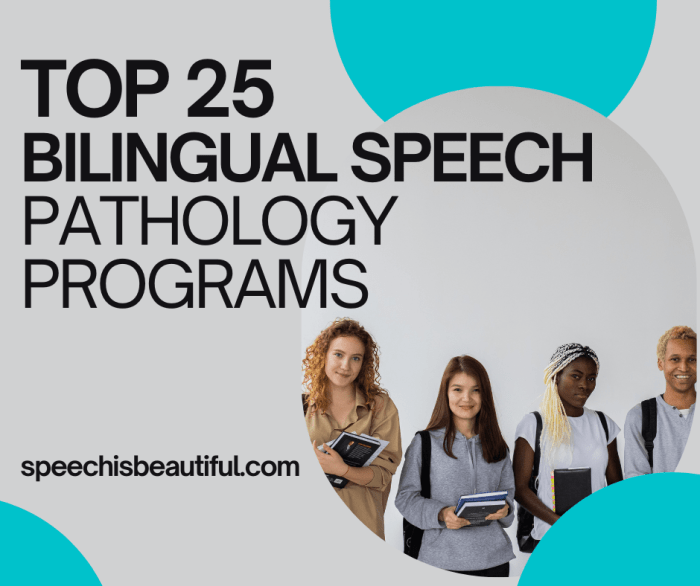Scholarships for speech language pathology graduate students – Embark on a journey to discover the comprehensive landscape of scholarships available to aspiring speech-language pathologists pursuing their graduate studies. This guide unveils a wealth of opportunities, empowering you to navigate the path to financial assistance and academic excellence.
Dive into the intricacies of eligibility criteria, application processes, and award details, equipping yourself with the knowledge to maximize your chances of success. Unlock the secrets of effective scholarship search strategies and harness the power of university resources and professional organizations to uncover hidden gems.
Comprehensive List of Scholarships
Graduate students pursuing Speech-Language Pathology degrees have access to a wide range of scholarships to support their education. These scholarships vary in eligibility criteria, application deadlines, and award amounts. To help you navigate the scholarship landscape, we have compiled a comprehensive list of scholarships specifically designed for graduate students in Speech-Language Pathology.
The following table provides a detailed overview of each scholarship, including its name, eligibility requirements, application deadline, and award amount. We encourage you to explore these opportunities and apply for those that align with your qualifications and career goals.
List of Scholarships, Scholarships for speech language pathology graduate students
| Scholarship Name | Eligibility Criteria | Application Deadline | Award Amount |
|---|---|---|---|
| ASHA Graduate Student Scholarship | ASHA member in good standing, enrolled in a master’s or doctoral program in Speech-Language Pathology | March 15 | $5,000 |
| NIDCD Ruth L. Kirschstein National Research Service Award (NRSA) | U.S. citizen or permanent resident, enrolled in a doctoral program in Speech-Language Pathology with a research focus | April 15 | $35,000 per year |
| American Speech-Language-Hearing Foundation (ASHAF) Graduate Scholarship | ASHA member in good standing, enrolled in a master’s or doctoral program in Speech-Language Pathology with a focus on research or clinical practice | June 1 | $10,000 |
| American Academy of Audiology Foundation (AAAF) Graduate Scholarship | Student enrolled in a master’s or doctoral program in Speech-Language Pathology with a focus on audiology | March 1 | $5,000 |
| Council for Exceptional Children (CEC) Graduate Scholarship | Student enrolled in a master’s or doctoral program in Speech-Language Pathology with a focus on special education | April 15 | $2,500 |
This list is not exhaustive, and there may be additional scholarships available through universities, professional organizations, and private foundations. We recommend that you conduct thorough research and explore all potential funding opportunities to maximize your chances of receiving financial support for your graduate studies in Speech-Language Pathology.
Scholarship Eligibility and Application Process

Obtaining scholarships as a Speech-Language Pathology graduate student requires meeting specific eligibility criteria and following a structured application process. This section will guide you through the typical requirements, application steps, common pitfalls to avoid, and strategies to enhance your chances of success.
Eligibility Requirements
Eligibility criteria for scholarships vary depending on the awarding organization. However, some common requirements include:
- Enrolled in a Speech-Language Pathology graduate program accredited by the Council on Academic Accreditation in Audiology and Speech-Language Pathology (CAA)
- Maintaining a minimum GPA (typically 3.0 or higher)
- Demonstrating financial need
- Meeting specific research or clinical experience requirements
Application Process
To apply for scholarships, follow these steps:
- Research and identify scholarships that align with your qualifications and career goals.
- Carefully review the application requirements and deadlines.
- Gather all necessary materials, such as transcripts, letters of recommendation, and a personal statement.
- Prepare a compelling application that showcases your academic achievements, research experience, and commitment to the field.
- Submit your application before the deadline and follow any additional instructions provided by the scholarship provider.
Common Application Mistakes to Avoid
- Failing to meet eligibility requirements
- Submitting incomplete or inaccurate applications
- Not proofreading your application for errors
- Missing application deadlines
- Writing a generic personal statement that does not highlight your unique qualities
Tips for Increasing Chances of Success
- Start your scholarship search early to allow ample time for research and preparation.
- Tailor your application to each scholarship you apply for, highlighting the specific skills and experiences that align with the award criteria.
- Seek feedback on your application from professors, mentors, or peers to ensure it is well-written and compelling.
- Follow up with scholarship providers after submitting your application to express your interest and inquire about the status of your application.
- Network with professionals in the field to learn about potential scholarship opportunities and build connections.
Scholarship Search Strategies: Scholarships For Speech Language Pathology Graduate Students
Finding and securing scholarships can significantly reduce the financial burden associated with graduate studies. Here are some effective strategies for Speech-Language Pathology graduate students to locate and research potential scholarships.
Utilizing scholarship databases, university resources, and professional organizations can greatly enhance your search efforts. Scholarship databases like Fastweb, Scholarships.com, and Cappex provide a comprehensive listing of scholarships tailored to specific criteria, including academic merit, financial need, and field of study.
University Resources
Universities often maintain their own scholarship databases and offer dedicated scholarship offices. These resources provide information on scholarships specifically available to students enrolled in their institution. Additionally, academic departments may offer scholarships to students within their respective fields.
Professional Organizations
Professional organizations such as the American Speech-Language-Hearing Association (ASHA) and the National Student Speech-Language-Hearing Association (NSSLHA) offer scholarships to members and students pursuing degrees in Speech-Language Pathology. These organizations provide valuable networking opportunities and access to scholarship information.
Tailoring Scholarship Searches
Tailoring your scholarship searches based on your individual qualifications and interests is crucial. Carefully review the eligibility criteria for each scholarship to identify those that best align with your academic achievements, financial situation, and career aspirations. Additionally, consider scholarships that support specific research interests or areas of specialization within Speech-Language Pathology.
User Queries
What are the eligibility requirements for scholarships for speech-language pathology graduate students?
Eligibility requirements vary depending on the scholarship, but typically include academic merit, financial need, and a commitment to the field of speech-language pathology.
How do I apply for scholarships for speech-language pathology graduate students?
Application processes vary depending on the scholarship, but generally involve submitting an application form, transcripts, letters of recommendation, and a personal statement.
What are some common mistakes to avoid when applying for scholarships?
Common mistakes include not meeting the eligibility requirements, submitting incomplete or inaccurate applications, and failing to proofread your application carefully.
How can I increase my chances of success when applying for scholarships?
To increase your chances of success, start your search early, tailor your applications to each scholarship, and seek feedback from mentors or advisors.




